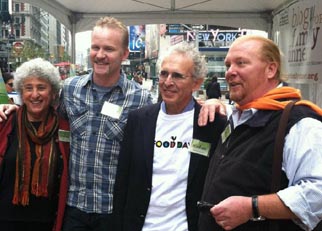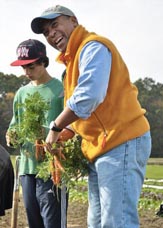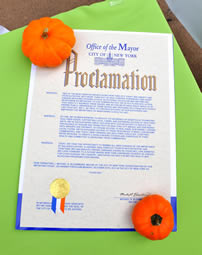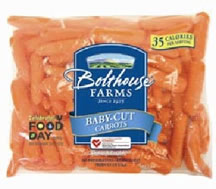Center for Communications, Health and the Environment

Food Day Aims to Improve Diets, Strengthen Healthy Food Movement
by Michael F. Jacobson, Ph.D., Executive Director and Food Day Founder, Center for Science in the Public Interest, Washington, D.C.
What we eat should bolster health, but the contemporary American diet is actually contributing to several hundred thousand premature deaths from heart attack, stroke, diabetes and cancer each year. What’s more, the way food is produced is often harmful to the environment, food and farm workers, and farm animals. Meanwhile, public health and nutrition programs are under attack in Washington, and federal subsidies favor Big Agriculture over smaller conventional and organic operations.
Enter Food Day, America’s celebration of and movement toward more healthy, affordable and sustainable food. National Food Day aims for nothing less than to transform the U.S. diet and improve the way food production impacts the planet and those on it.
 |
Food Day participants at a San Francisco farmers market show off some local produce. |
Modeled on Earth Day, Food Day is powered by a diverse coalition of food movement leaders and individuals who hold events every October 24 to educate, raise awareness and mobilize constituencies to improve food policies. It was created and is spearheaded by the Center for Science in the Public Interest (CSPI), a consumer advocacy group that conducts innovative health and nutrition research and advocacy programs, and provides consumers with up-to-date and useful information about health and well-being.
Food Day Past and Present
More than 2,300 events in all 50 U.S. states took place on the first Food Day in 2011, and food movement leaders are now gearing up for the second annual Food Day, which will take place on Wednesday, October 24, 2012, just 12 days before the 2012 elections. This timing, organizers expect, will provide an opportunity for U.S. citizens to make their voices heard and for candidates to discuss important food policy issues. In addition, organizers intend the non-partisan Food Day 2012 to represent an even bigger grassroots campaign, driven in part by the launch of FoodDay.org version 2.0. This new Web site makes it easier for movement leaders to register Food Day activities and connect with other activists, provides resources for people seeking up-to-date information about food issues, and features a blog with posts from Food Day advisors and national partners such as celebrated food author Michael Pollan; restaurateur, author and food activist Alice Waters; and her restaurant
 |
Food Day Advisory Board members nutrition expert Marion Nestle and filmmaker Morgan Spurlock, and celebrity chef Mario Batali pose with article author and Food Day founder Michael Jacobson (second from right). |
Chez Panisse. In addition to Pollan and Waters, Food Day’s 2012 advisory board includes prominent physicians Caldwell Esselstyn, Michael Roizen and David Satcher; nutrition authorities Walter Willett, Kelly Brownell and Marion Nestle; actor Jane Fonda; filmmaker Morgan Spurlock; Rodale, Inc. Chief Executive Officer (CEO) Maria Rodale and Bolthouse Farms CEO Jeff Dunn; chefs Dan Barber and Nora Pouillon; and cookbook author and Food Network host Ellie Krieger.
Food Day brings together organizations and individuals working on food issues as varied as hunger, nutrition, agriculture policy, animal welfare and farmworker justice. Some 2011 Food Day events were large in scale, such as a festival in Savannah, Ga., that attracted 7,000 attendees and featured more than 40 exhibitors, chef demos and workshops on gardening and seasonal cooking. There was also the “Eat In” in the middle of New York’s Times Square staged by food activists, attended by celebrities, chefs and the New York City health commissioner, and featuring huge digital displays of Food Day images from around the country, as well as a special menu by Krieger.
 Campaign Objectives
Campaign Objectives
Though much of what happens on Food Day is celebratory in nature, it is also meant to catalyze grassroots action at the local, state and national levels. Food Day’s Washington, D.C., headquarters, for example, has organizers who work with activists across the country to provide support for local organizing efforts and build connections between local groups working on food issues. This hands-on approach, coupled with targeted use of social media such as Facebook and Twitter, will help Food Day organizers build a stronger, more united food movement in 2012.
 |
|
Campaign founder Jacobson chats with Food Network host Ellie Krieger at the Times Square "Eat In" on Food Day 2011, while a huge digital display (above) celebrates the event.
|
|
This year, Food Day is focused on five main goals:
- Promoting safer, healthier diets. Every year Americans spend around $147 billion on direct and indirect diet-related health-care costs.
- Supporting sustainable and organic farms. Sustainable farms are those that meet the needs of today without comprising the ability of future generations to do the same. Yet, of the $16 billion allocated to federal farm subsidy programs in the United States each year, 74 percent goes to huge farms, many of which contribute to poor health and severe environmental degradation.
- Reducing hunger. Currently, around 50 million Americans are considered "food insecure," or near hunger, and participation in the U.S. Department of Agriculture’s Supplemental Nutrition Assistance Program (SNAP), the nation’s food stamp program, is at an all-time high. SNAP is vital to reducing hunger in the United States, particularly among children, but the program’s budget is under constant attack, while federal measures to increase food access are minimal.
- Reforming factory farms to protect the environment. Confined animal feeding operations (CAFOs) require exorbitant amounts of water, antibiotics commonly used in human medicine, grain feed produced with chemical fertilizers and pesticides, and fossil fuels in order to supply cheap meat. These practices contribute to soil erosion, water and air pollution, the formation of antibiotic-resistant "superbugs," illnesses in workers and animals, and many other problems.
- Supporting fair working conditions for food and farm workers. Food and farm workers are some of the most marginalized in the United States. Many farmworkers earn well below poverty levels, are forced to work when ill, have no access to health care and are exposed to poisonous chemicals on a daily basis.
Legislators Take the Leap
 |
Massachusetts Gov. Deval Patrick gets his hands dirty at a gleaning event for Food Day 2011. |
Recognizing a win-win, prominent politicians and decision makers are actively supporting Food Day and promoting its potential for positive impact. In 2011, elected officials used the national event to launch new food policies, highlight locally grown produce and issue proclamations. Massachusetts Gov. Deval Patrick teamed with the state’s Agriculture Department to promote gleaning, the act of rescuing excess or unmarketable produce from farm fields (a process that has enabled the neighboring Vermont Foodbank alone to distribute as much as 400,000 pounds of fresh local produce each year). Meanwhile, Boston Mayor Thomas Menino used Food Day 2011 to deliver a “State of the Food Union” address. In Maine, Democratic Rep. Chellie Pingree announced a new bill to assist small and mid-sized farms, while in California, Los Angeles Mayor Antonio Villaraigosa’s Food Policy Council coordinated healthy cooking demonstrations, film screenings and other events to mark the day. On the opposite coast, New York City Mayor Michael Bloomberg handed out locally grown apples to commuters in Queens in celebration.
"Food Day helped us to create a roadmap towards better policies and health interventions, and the foundation we established was very powerful,” said Alexa Delwiche, coordinator of the Los Angeles Food Policy Council. “I am very excited about the future. We saw what can happen with a small amount of planning and momentum."
National associations and grassroots organizations are also staunch supporters of Food Day and its tenets. In 2012, campaign participants will include the Academy for Nutrition and Dietetics (formerly the American Dietetic Association), American Public Health Association, Community Food Security Coalition, Earth Day Network, Farmers Market Coalition, Humane Society of the United States, National Sustainable Agriculture Coalition, Prevention Institute and Slow Food USA. Many city, county, and state health and agriculture departments will also take part.
"With Food Day, Arizona’s public health system was able to build momentum with the initiatives we have been promoting for a long time,” said Adrienne Udarbe, community programs manager for the Arizona Department of Health Services, of its 2011 experience.
 |
The official proclamation declaring |
Mayors Formalize Involvement
At their 2012 conference in June, America’s mayors formalized their support for Food Day, adopting a resolution declaring October 24 as Food Day and urging all mayors to participate.
“Food Day is an important event that addresses some of the critical problems facing many cities in America – accessibility and affordability of fresh food – [and] I support the...resolution and the principles of Food Day,” said Philadelphia Mayor Michael A. Nutter, chairman of the U.S. Conference of Mayors, who joined with Boston’s Menino, chairman of the group’s food policy task force; L.A.’s Villaraigosa; and the mayors of Baltimore, St. Louis, University City, Mo. and Providence, R.I. to sponsor the resolution.
“Every day, more of our nation’s mayors are joining the food revolution to put more healthy and local food into city neighborhoods and schools,” noted Menino. And, according to CSPI data, they are doing this by setting up food policy councils, promoting urban farming and gardening, and adopting policies that promote healthy eating and improve the food environment in America’s cities.
In addition to U.S. mayors, since 2011, 71 cities and 18 states’ governors have issued proclamations declaring October 24 Food Day.
 |
For Food Day 2011, millions of Dole bananas and bags of Bolthouse carrots sported the campaign logo.
|
 |
Corporate Participation
Even though Food Day is, at heart, an activist movement, organizers welcome the participation of responsible corporations. In fact, Food Day offers an opportunity for food and other companies to announce such things as new consumer-friendly policies and wellness programs for employees – while boosting their public personas and presence.
In 2011, for example, Dole Foods affixed Food Day stickers to 100 million bananas, while Bolthouse Farms, one of the nation’s leading carrot growers, printed the campaign logo on 11 million bags of baby carrots. The Cooking Channel, a sister channel of the Food Network, sponsored a digital and social media blitz, and produced compelling promotional spots featuring filmmaker and Food Day advisory board member Spurlock that it broadcast during the two weeks leading up to the event. Epicurious.com, the nation’s leading online recipe destination, featured Food Day on its Web site and partnered with Whole Foods Market to raise funds for local food charities as part of the campaign. And Disney referenced Food Day on its “Magic of Healthy Living” Web site, with a mention in its Healthier Halloween Kit, inspiring kids to try nutritious and fun candy alternatives.
Other companies that took part in Food Day 2011 included Kraft Foods, Sodexo, Aramark, Hain Celestial and LSG Sky Chefs, the world’s largest provider of in-flight services, which launched a nutrition and wellness education campaign for its approximately 8,000 North American employees. Many local restaurants and grocery stores also participated, and going forward it is hoped that more food manufacturers and growers will use Food Day to announce changes that benefit the health of consumers, employees, farm animals and the environment.
Message Reaches Millions
Food Day’s overarching message is simple: “It’s time to eat real.” And thanks to generous media coverage in 2011, Food Day’s message reached millions of Americans. Food Day events around the country attracted newspaper coverage in 216 local news outlets in more than 140 cities, including The Boston Globe, Los Angeles Times, The Philadelphia Inquirer, USA Today and The Washington Post. The Food Day message also reached 10 million Americans via local television stations, with Mayor Bloomberg promoting the national event on ABC’s lifestyle series The Chew.
Several Food Day advisory board members have penned opinion columns to mark the occasion, including Sen. Tom Harkin (D-IA) and Rep. Rosa DeLauro (D-CT), who together published an op-ed in Roll Call in 2011, and former Surgeons General David Satcher and Richard Carmona, who published a joint op-ed in the Sacramento Bee and other newspapers that same year.
Participation Counts
In 2012, Food Day will reach millions of Americans through events on college campuses, schools, houses of worship and restaurants. Organizers also plan to make unprecedented use of social media, encouraging people to share tips for “Eating Real” on Facebook and using the #FoodDay2012 hashtag on Twitter. Visitors to the new FoodDay.org will be able to find events near them, or create their own, and use social media to spread the word.
But Food Day can also be celebrated by simple, solitary acts of personal responsibility, such as boycotting soda or other sugar-based drinks, or foregoing fast food in favor of a healthy, brown-bag lunch. In addition, families can participate in Food Day by rediscovering cooking together and eating at home, perhaps with special attention paid to nutrition or locally sourced produce.
There are problems in America’s food supply that need fixing, and Food Day strives to inspire people to work together to solve them. For some people, this may mean joining a local food policy council, testifying in front of a school board or city council, or supporting a local food organization or cooperative. Others may choose to observe Food Day by making positive changes for themselves and their families. No matter how individuals decide to mark the occasion, however, the key is that they celebrate Food Day, and by doing so contribute to an ever-widening circle of awareness and action.
Read More:
Spotlight Article: Eat Safe: Sweeping Policy Reforms, Surveillance and New Strategies Combat Global Outbreaks of Foodborne Illness
CECHE News: CECHE Partners in D.C. and New Delhi to Boost Nutrition and Healthy Food Practices

Dr. Sushma Palmer, Program Director
Valeska Stupak, Editor & Design Consultant
Shiraz Mahyera, Systems Manager
Daniel Hollingsworth, Website Consultant